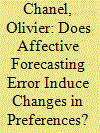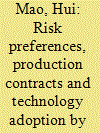|
|
|
Sort Order |
|
|
|
Items / Page
|
|
|
|
|
|
|
| Srl | Item |
| 1 |
ID:
192043


|
|
|
|
|
| Summary/Abstract |
This paper investigates how affective forecasting errors (A.F.E.s), the difference between anticipated emotion and the emotion actually experienced, may induce changes in preferences on time, risk and occupation after combat. Building on psychological theories incorporating the role of emotion in decision-making, we designed a before-and-after-mission survey for Danish soldiers deployed to Afghanistan in 2011. Our hypothesis of an effect from A.F.E.s is tested by controlling for other mechanisms that may also change preferences: immediate emotion, trauma effect – proxied by post-traumatic stress disorder (P.T.S.D.) – and changes in wealth and risk perception. At the aggregate level, results show stable preferences before and after mission. We find positive A.F.E.s for all three emotions studied (fear, anxiety and excitement), with anticipated emotions stronger than those actually experienced. We provide evidence that positive A.F.E.s regarding fear significantly increase risk tolerance and impatience, while positive A.F.E.s regarding excitement strengthen the will to stay in the military. Trauma has no impact on these preferences.
|
|
|
|
|
|
|
|
|
|
|
|
|
|
|
|
| 2 |
ID:
149996


|
|
|
|
|
| Summary/Abstract |
We consider a risk-aware forest owner and electricity producer evaluating the Reduced Emissions from Deforestation and Degradation (REDD)-based offsets with a benefit-sharing mechanism under uncertain CO2 prices. For a range of CO2 prices and respective risks perceived by the forest owner (seller) and electricity producer (buyer), we apply a model of fair (indifference) pricing. Parties’ risk preferences are reflected by exponential utility functions. The potentially contracted amounts of REDD offsets are analyzed under various risk preferences and for different benefit-sharing opportunities. Our results show that a risk-averse attitude considerably increases the contracted offset amounts (compared to risk-neutral case) and, therefore, creates a higher potential for REDD implementation. We demonstrate possible situations, when parties could agree on a certain range of REDD contracts, e.g. smaller amounts of REDD offsets are traded for higher prices, and larger amounts – for lower prices, although contracting a moderate amount at a moderate price is impossible. The suggested benefit-sharing mechanism can help increase contracted offset amounts. Our modeling results highlight two ways to promote higher REDD participation: (i) strengthening the carbon price signal to reveal risk-averse behavior of energy producers, and (ii) implementing the mechanism of benefit/risk sharing between the REDD consumer and supplier.
|
|
|
|
|
|
|
|
|
|
|
|
|
|
|
|
| 3 |
ID:
192227


|
|
|
|
|
| Summary/Abstract |
Given their citizens’ religiosity, the presence of religious parties, and the salience of religion in the politics of India and Pakistan, it is likely that politicians in both of these countries vary considerably in how religious they are. How do these differences influence their political and policy choices? We know surprisingly little about this question. This paper uses data from survey experiments fielded to politicians in India (in 2019) and Pakistan (in 2018) to examine how religiosity is correlated with politicians’ risk-taking behaviors. Given that research finds they are correlated in citizens and the ubiquity of both risk and religion in politics, understanding this relationship is important. The experimental data reveal that in both countries highly religious and less religious politicians make very different choices on a risky policy decision. Highly religious politicians are risk-seeking in India but risk-averse in Pakistan. While the less religious politicians approximate rational actors, the highly religious politicians violate both rational actor and prospect theory decision-making models.
|
|
|
|
|
|
|
|
|
|
|
|
|
|
|
|
| 4 |
ID:
170092


|
|
|
|
|
| Summary/Abstract |
This study expands on existing research on farmers' risk preferences and technology adoption, with novel analysis of the relationship between risk preferences, production contract participation, and technology investment levels and adoption time. Our analysis uses farm-level data from 345 Chinese broiler growers, and used an instrumental variables strategy and endogenous switching models to address the potential endogeneity of the contracting decision. Both the distance of the farm to the nearest broiler business and the distance of the farm to the nearest market for broiler sale are used as instrumental variables for the contracting decision. Results indicate that farmers with higher risk aversion are more likely to participate in production contracts, less likely to adopt new technology, adopt technology later, and invest less in technology. In the subsample of contract farmers, production contracts with longer terms, lower upfront deposit requirements and higher cost sharing with enterprises for technology adoption may make farmers more likely to adopt technology, to adopt technology early and to invest more. These findings jointly suggest that contract terms that help alleviate credit constraints may be more effective at promoting technology adoption in developing countries.
|
|
|
|
|
|
|
|
|
|
|
|
|
|
|
|
| 5 |
ID:
168998


|
|
|
|
|
| Summary/Abstract |
When war breaks out, how important are risk preferences to explaining why some individuals stay in conflict zones while others take flight? We examine risk tolerance among rebel combatants and civilians in Aleppo, Syria using a variation of the Eckel-Grossman Choice Game. Field work in Syria was conducted in 2013–14 with a total of 232 participants to include both Syrian civilians and active rebel fighters in Aleppo and Idlib Province, as well as among Syrian refugees in neighboring Turkey. Compared to Syrians in other locations, people in rebel-held territory of Aleppo, both combatants and non-combatants, are significantly more risk tolerant. We consider possible explanations for elevated risk preferences in Aleppo based on self-selection, adaptive learning, a sense of self-efficacy to affect future outcomes, conflict-related grievances, and in-group solidarity. Our analysis suggests that self-selection based on access to resources and a strong sense of self-efficacy may explain higher propensity for risk-taking. Overall, our results speak to a plausible sorting mechanism during conflict where risk averse individuals select out of conflict, while highly risk tolerant individuals are more prone to discount the inherent dangers of remaining in conflict zones. Our results provide new micro-level explanation for why some societies become mired in conflict traps involving highly risk tolerant fighting communities.
|
|
|
|
|
|
|
|
|
|
|
|
|
|
|
|
|
|
|
|
|